

Apollonius of Rhodes. Ancient Greek epic poet Apollonius of Rhodes (Ancient Greek: Ἀπολλώνιος Ῥόδιος Apollṓnios Rhódios; Latin: Apollonius Rhodius; fl. first half of 3rd century BCE), was an ancient Greek author, best known for the Argonautica, an epic poem about Jason and the Argonauts and their quest for the Golden Fleece.
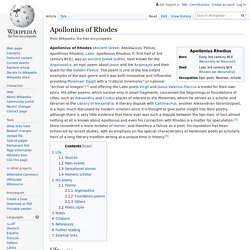
The poem is one of the few extant examples of the epic genre and it was both innovative and influential, providing Ptolemaic Egypt with a "cultural mnemonic" or national "archive of images",[1] and offering the Latin poets Virgil and Gaius Valerius Flaccus a model for their own epics. Poseidon. Rhea. Rhea could mean: Mythology[change | change source] People[change | change source] These people have "Rhea" as their family name: Caroline Rhea (b.1964), stand-up comedian, television actress and hostDarrel Rhea, CEO, CheskinJames Rhea (1791-1812), US soldierLa Julia Rhea (1908-1992), US opera singer These people have it as their given name: Rhea Hughes, Philadelphia radio personalityRhea Perlman (b. 1948), US television actressM.
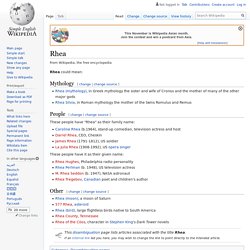
Kronos. Kronos appears as the main antagonist in Rick Riordan's Percy Jackson and the Olympians series.
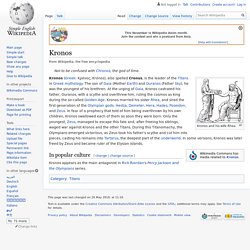
Zeus. The supreme deity of the Greek pantheon, Zeus was universally respected and revered throughout Ancient Greece; the ancient Olympic Games were held at the site of Olympia every four years in honor of him.
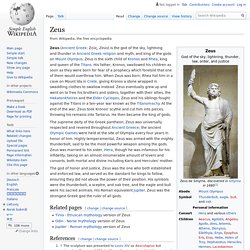
Highly temperamental, Zeus was armed with the mighty thunderbolt, said to be the most powerful weapon among the gods. Zeus was married to his sister, Hera, though he was infamous for his infidelity, taking on an almost innumerable amount of lovers and consorts, both mortal and divine including Karis and Hercules' mother. Related pages[change | change source] Argonautica. Greek epic poem dated to the 3rd century BC Jason and the Argonauts Arriving at Colchis, by Charles de La Fosse.
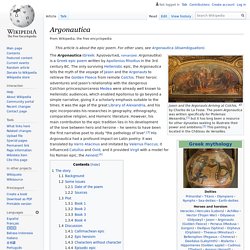
The poem Argonautica was written specifically for Ptolemaic Alexandria,[1] but it has long been a resource for other dynasties seeking to illustrate their power and ambitions.[2] This painting is located in the Château de Versailles. Apollonius of Rhodes. Jason. We ask you, humbly: don't scroll away.
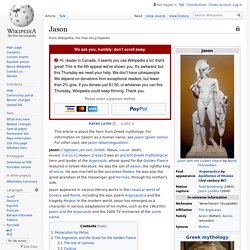
Hi, reader in Canada, it seems you use Wikipedia a lot; that's great! This is the 6th appeal we've shown you. It's awkward, but this Thursday we need your help. We don't have salespeople. We depend on donations from exceptional readers, but fewer than 2% give. Argonauts. A band of heroes in Greek mythology We ask you, humbly, to help.
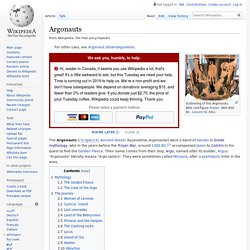
Hi, reader in Canada, it seems you use Wikipedia a lot; that's great! It's a little awkward to ask, but this Tuesday we need your help. Time is running out in 2019 to help us. We’re a non-profit and we don't have salespeople. Thank you! Golden Fleece. Fleece of the gold-haired winged ram in Greek mythology In Greek mythology, the Golden Fleece (Greek: Χρυσόμαλλο δέρας Chrysómallo déras) is the fleece of the golden-woolled,[a] winged ram, Chrysomallos, which was held in Colchis.[1] The fleece is a symbol of authority and kingship.
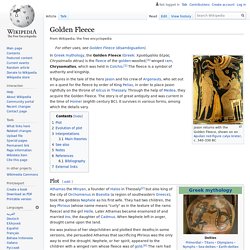
It figures in the tale of the hero Jason and his crew of Argonauts, who set out on a quest for the fleece by order of King Pelias, in order to place Jason rightfully on the throne of Iolcus in Thessaly. Through the help of Medea, they acquire the Golden Fleece. The story is of great antiquity and was current in the time of Homer (eighth century BC).
It survives in various forms, among which the details vary. Colchis. Historical region of Antiquity Internationally, Colchis is perhaps best known for its role in Greek mythology, most notably as the destination of the Argonauts, as well as the home to Medea and the Golden fleece.[3] It was also described as a land rich with gold, iron, timber and honey that would export its resources mostly to ancient Hellenic City states.[4] Geography and toponyms[edit] Colchian scent bottle fourth century BC Colchís, Kolkhís[7][8][9][10] or Qulḫa[11][12][13] which existed from the c. 13th to the 1st centuries BC is regarded as an early ethnically Georgian polity;[by whom?
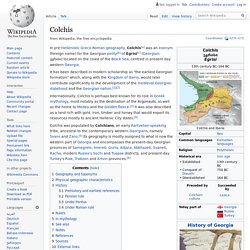
Medea. She aids Jason in his search for the Golden Fleece out of love, assisting him with her magic and saving his life in several quests, playing the role of an archetypal helper-maiden, before abandoning her native Colchis, marrying him, and fleeing with him westwards where they eventually settle in Corinth.
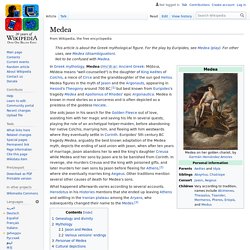
Euripides' 5th century BC tragedy Medea, arguably the best known adaptation of the Medea myth, depicts the ending of said union with Jason, when after ten years of marriage, Jason abandons her to wed the king's daughter Creusa while Medea and her sons by Jason are to be banished from Corinth. In revenge, she murders Creusa and the king with poisoned gifts, and later murders her own sons by Jason before fleeing for Athens,[2] where she eventually marries king Aegeus. Other traditions mention several other causes of death for Medea's sons. Library of Alexandria. One of the largest libraries in the ancient world, located in Alexandria, Egypt The Great Library of Alexandria in Alexandria, Egypt, was one of the largest and most significant libraries of the ancient world.
The Library was part of a larger research institution called the Mouseion, which was dedicated to the Muses, the nine goddesses of the arts.[10] The idea of a universal library in Alexandria may have been proposed by Demetrius of Phalerum, an exiled Athenian statesman living in Alexandria, to Ptolemy I Soter, who may have established plans for the Library, but the Library itself was probably not built until the reign of his son Ptolemy II Philadelphus. The Library quickly acquired many papyrus scrolls, due largely to the Ptolemaic kings' aggressive and well-funded policies for procuring texts. It is unknown precisely how many such scrolls were housed at any given time, but estimates range from 40,000 to 400,000 at its height.
Historical background[edit] Varro Atacinus. Only fragments of his works survive. His first known works are Bellum sequanicum, a poem on Julius Caesar's campaign against Ariovistus, and some satires; these should not be confused with the Menippean Satires of the other Varro, of which some 600 fragments survive. He translated the Alexandrian poet Apollonius Rhodius' Argonautica into Latin. Gaius Valerius Flaccus. Gaius Valerius Flaccus (; died c. AD 90) was a 1st century Roman poet who flourished during the "Silver Age" under the Flavian dynasty,[1][2] and wrote a Latin Argonautica that owes a great deal to Apollonius of Rhodes' more famous epic.[3][4] Life[edit] The only widely accepted mention of Gaius Valerius Flaccus by his contemporaries is by Quintilian (10.1.90),[5] who laments the recent death of "Valerius Flaccus" as a great loss; as Quintilian's work was finished about 90 AD, this traditionally gives a limit for the death of Flaccus.
Catullus. Modern bust of Catullus on the Piazza Carducci in Sirmione.[1] Gaius Valerius Catullus ( kə-TUL-əs, Latin: [kaˈtʊllʊs]; c. 84 – c. 54 BCE) was a Latin poet of the late Roman Republic who wrote chiefly in the neoteric style of poetry, which is about personal life rather than classical heroes. His surviving works are still read widely and continue to influence poetry and other forms of art. Catullus's poems were widely appreciated by other poets, significantly influencing Ovid and Virgil, among others. Ovid. Life[edit] Ovid talks more about his own life than most other Roman poets. Information about his biography is drawn primarily from his poetry, especially Tristia 4.10, which gives a long autobiographical account of his life. Other sources include Seneca the Elder and Quintilian. Virgil. 1st-century BC Roman poet. Aeneid. The hero Aeneas was already known to Greco-Roman legend and myth, having been a character in the Iliad.
Apollonius of Rhodes. Ancient Greek epic poet. Paradoxography. Callimachus. Novel. Origin myth. Ptolemy II Philadelphus. Ptolemy III Euergetes. Ptolemy III Euergetes (Greek: Πτολεμαίος Εὐεργέτης Ptolemaios Euergetes "Ptolemy the Benefactor"; c. 280 – November/December 222 BC) was the third king of the Ptolemaic dynasty in Egypt from 246 to 222 BC. Pindar. Odyssey. Planctae. Symplegades. Iliad.
Hesiod. Medea. Pelias. Medus. Chiron. Kutaisi. Aeëtes. Mimnermus. Solon. Pindar. Apollo. Pelias. Iolcus. Colchis. Golden Fleece. Argo. Argus. Athena. Heracles. Idas. Idmon. Orpheus. Tiphys. Dodona. Thessaly. Lemnos. Hypsipyle. Dardanelles. Kapıdağ Peninsula. Poseidon. Cyzicus. Cleite. Mopsus. Rhea. Cybele. Cius. Hylas. Nymph. Polyphemus. Telamon.
Glaucus. Apollonius of Rhodes. Abraham Ortelius. Bebryces. Amykos. Castor and Pollux. Phineus. Thyni. Harpy. Boreads. Symplegades. Athena. Hyperborea. Acheron. Hades. Lycus. Sthenelus. Sinop, Turkey. Terme River. Phrixus. Aeëtes. Caucasus. Prometheus. Phasis. Erato. Muses. Hera. Athena. Mount Olympus.